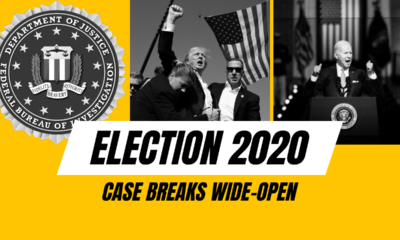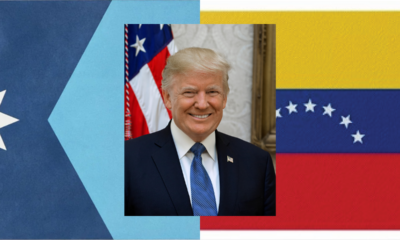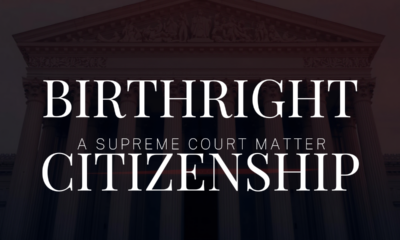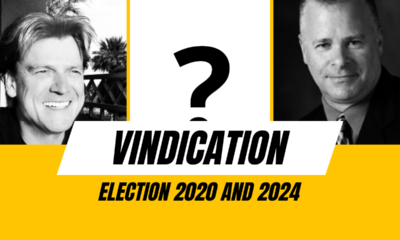Education
The Overton Window
The Overton Window shows what policies people will vote for at any given time. Education and discernment (or propaganda) can change it.
A new name for an old concept has become current in American politics today. It’s an answer to the question: what public policies will the people support? Until the election of Donald J. Trump, few people, outside of political science classes, knew this name. In fact, in any given era, the public, or enough of them, will support policies that fall into a certain range. We call that range the Overton Window. Here, CNAV will try to explain it as best we can.
What is the Overton Window?
The Overton Window takes its name from Joseph P. Overton, then Senior Vice-President of the Mackinac (pronounced Mack-In-Naw) Center for Public Policy. The precise policy agenda of the Mackinac Center doesn’t matter here. What matters is that Mr. Overton recognized that politics is a sales campaign. And when you’re selling something, people will buy it only if it falls within a range of what they imagine will work best for them. Anyone can suggest a public policy prescription in any given area. Whether a society will adopt it, depends on what the decision makers think of it. Those decision makers, in turn, will always define a range of policy prescriptions they will accept. After Mr. Overton died, his boss, Joseph G. Lehman, President of the Mackinac Center, named that range the Overton Window.
Nearly every other artist represents the Overton Window in one dimension. But the Overton Window is actually a “subspace” within the vast space of all possible public policy prescriptions. Furthermore, that space has as many dimensions as one must assume to consider all areas in which public policy can affect a society and every member of it. The Overton Window has as many dimensions as the larger space that includes it.
The very agenda page of the Mackinac Center illustrates this point. They advocate for free markets but also for “clean energy” and “essential services.” The Overton Window must have at least two, and perhaps three or more, dimensions to cover different policy combinations.
Does it have a fixed size or proportion?
The Overton Window has no fixed size, any more than it has a fixed position. Any given time could see a wide, or a narrow, range of policy prescriptions that even bear acceptable mention.
Typical think-tank members speak of “a variety of influences” that can grow, shrink, or shift the Overton Window. But the most important consideration for the placement and size of the Overton Window is values. Beyond that, one considers any risk to those values, and how much risk one will tolerate.
Furthermore, risk tolerance relating to any one value, almost always involves a clash of values. All values are relative. As Robert A. Heinlein once said, the value one places on any given thing depends on:
- What can he do with that thing – its use to him, and
- What must he pay to get that thing – its cost to him.
The late entertainer Jack Benny gave the most famous illustration of how one weighs use and cost of competing values. A hoodlum holds him up and makes a time-honored demand.
Hoodlum: Your money or your life!
Benny: [silence]
Hoodlum: Look bud, I said, your money or your life!
Benny: I’m thinking it over!
That applies to a country, too. Say another country sends an army to demand tribute. A country facing such a demand can pay it, ignore the demand and risk an attack, or even strike pre-emptively.
The Overton Window governs which choice an individual, group, or country will make.
How large or small should the Overton Window be?
What makes an Overton Window large enough, too large, or too small, is a value judgment. That judgment depends on the value of:
- “Getting along” with those of a different political persuasion than yours, or
- Tolerating diverse political ideas.
The size of the Overton Window determines room for debate. An autocrat (or military commander) might have a point-sized window – no size, no debate. A society that values freedom of debate will have a large window – and often inconsistent policies between election cycles.
Political parties will have Overton Windows of their own. Advocates like Laura Loomer (who was a journalist before she became a candidate) often say the (currently) established leadership of the Republican and Democratic Parties seem more friendly toward one another than she might wish. She coined the word Uniparty to express her disdain. The real source of her angst is that:
- The two Party establishments have overlapping or even coinciding Overton Windows, and
- She lies well outside the overlap and even the Overton Window of the Republican establishment.
But she lies well within the Overton Window of the new Donald Trump faction of the Republican Party.
Social and Party Overton Windows
Which illustrates one principle that Mr. Overton might not have written down. Which is: the Overton Window for the larger society, if it has one, is the overlap of Overton Windows for the political parties that contend for power. By this definition, moderate policies fall within the overlap, and extreme policies fall outside that overlap.
But suppose Party Overton Windows do not overlap? Then continual strife will rule. Public policy will seesaw between (or among) the respective Overton Windows of the two (or more) Parties striving for power. America has already seen the worst case of such strife: the War Between the States, from 1861 to 1865. But such strife does not have to go that far. If enough people adopt the values of one Party, the other Party will disappear. The strife will then disappear with it, as happened during the American Era of Good Feelings (1816 to 1820).
What moves the window?
Because values, risk, and risk tolerance determine the size and position of the Overton Window, anyone wishing to shift, grow, or shrink that window must change either the common values or our perception of the risks to them. Education brings about changes of values. Discernment and careful observation – or propaganda – will change the second part. The third part depends on the first, because risk tolerance is about choosing between and among competing values.
This puts the school-election support campaign of Gov. Ron DeSantis (R-Fla.) into its proper perspective. Few have realized how important that campaign will be, or its lasting effects. But at least one Assistant Principal in an elementary school in Greenwich, Connecticut understands the power of education. Jeremy Boland actually said out loud that he won’t hire conservative teachers. Furthermore, he wants his teachers to “subtly” present “progressive” ideas in class. But he said it to a Project Veritas journalist. This interview is the result.
Which shows one dangerous and often ineffective way to move the Overton Window: with lies. In contrast to Mr. Boland, Gov. DeSantis said up-front that he wants to affect children’s values. He won his case, and his victory will last longer.
More broadly, those who care about their values, can move the Overton Window at least to respect them. One determined and united set of voices can move it their way. But two such sets will achieve stalemate – or something less pleasant.
Terry A. Hurlbut has been a student of politics, philosophy, and science for more than 35 years. He is a graduate of Yale College and has served as a physician-level laboratory administrator in a 250-bed community hospital. He also is a serious student of the Bible, is conversant in its two primary original languages, and has followed the creation-science movement closely since 1993.
-

 Accountability3 days ago
Accountability3 days agoWaste of the Day: Principal Bought Lobster with School Funds
-

 Executive1 day ago
Executive1 day agoHow Relaxed COVID-Era Rules Fueled Minnesota’s Biggest Scam
-

 Civilization8 hours ago
Civilization8 hours agoWhy Europe Shouldn’t Be Upset at Trump’s Venezuelan Actions
-

 Constitution2 days ago
Constitution2 days agoTrump, Canada, and the Constitutional Problem Beneath the Bridge
-

 Civilization1 day ago
Civilization1 day agoThe End of Purple States and Competitive Districts
-

 Christianity Today8 hours ago
Christianity Today8 hours agoSurprising Revival: Gen Z Men & Highly Educated Lead Return to Religion
-

 Civilization5 days ago
Civilization5 days agoThe devil is in the details
-

 Executive20 hours ago
Executive20 hours agoWaste of the Day: Can You Hear Me Now?















Worth reading and thinking about. One reason people need to both listen and look past the rhetoric to the actions and results.